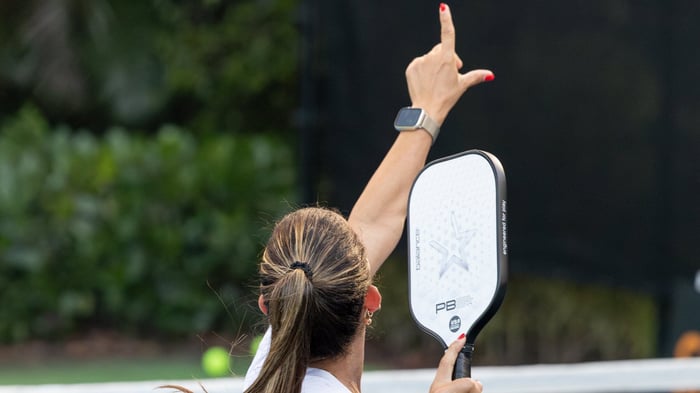Key takeaways:
A pickleball journal builds self-awareness and helps track minor improvements you might miss otherwise.
Recording what worked, what didn’t, and how you felt keeps your practice focused and your goals clear.
Turning your notes into action and pairing journaling with the right pickleball gear supports steady progress on the court.
Every player hits a point where they wonder if they’re really getting better or just repeating the same habits. Keeping a pickleball journal is one of the simplest ways to find out. By jotting down quick notes about your practice sessions and matches, you build self-awareness and start spotting patterns you might otherwise miss.
At PB5star, we know how important tools like progress journals are in helping players play smarter. Learn how a simple notebook can turn casual rallies into clear progress you can see every time you flip through your pages.
Why journaling helps pickleball players
Journaling is a practical way to turn your pickleball time into a clear path forward. When you take a few minutes to reflect after a session, you learn from every win, loss, and rally in between. Here’s why players who journal often see faster improvements:
Helps you see the truth: It’s easy to forget missed shots or mental slip-ups, but writing them down keeps you honest about where you stand.
Captures your wins: Noting what you did right gives you a list of strategies to repeat next time.
Connects dots over time: Journals reveal patterns in your strengths and weaknesses that you can’t spot in a single game.
Guides smarter practice: Each entry can shape what you choose to drill next, making each practice session more useful.
Keeps you invested: Flipping through old notes reminds you how far you’ve come, which is motivating when progress feels slow.
This small habit builds self-awareness that sticks with you every time you step on the court.
What to record in your pickleball journal
A good pickleball journal isn’t just a list of wins and losses. It’s a snapshot of how you think, feel, and play each time you step on the court. Knowing what to write helps you get the most out of this simple habit. Below are five things worth recording every time you play:
Date and location
Always jot down the date and where you played. Over time, this helps you see if certain courts or playing conditions affect your game, which can be surprisingly useful.
Playing partners or opponents
Note who you played with or against. Some players push you harder, while others help you try new shots. Knowing your regular matchups can explain certain trends in your notes.
Shots and strategies that worked
Be specific about what felt strong during the session—maybe your drop shots were on point or your serves had extra spin. This helps you repeat what’s working next time.
Shots or plans that fell apart
It’s just as helpful to note what didn’t go well. Maybe your volleys were too high, or you got stuck repeating the same pattern. These notes highlight exactly what to practice.
Your mindset and energy
Write a line or two about how focused or confident you felt. Sometimes mental slips matter more than technical ones, and you’ll see how mood and energy link to performance.
How to organize your journal for maximum benefit
A well-organized journal turns scattered notes into a clear roadmap for improvement. Here’s how to set up your journal so it actually helps you grow:
Use clear sections or headings: Divide your notebook or app into parts like “Goals,” “Daily Notes,” and “Areas to Improve.” This keeps your thoughts neat and easy to revisit later.
Rate key skills each session: Give simple scores to aspects like serve accuracy, footwork, and net play. Over time, these numbers show where you’re getting stronger.
Add quick reminders: Leave a small space to jot down what you want to try differently next time, like adjusting grip or changing serve placement.
Highlight wins and lessons learned: Use symbols or colors to mark standout moments so they’re easy to find when reviewing old entries.
Keep it flexible: Don’t stress about perfect grammar or long sentences — quick, honest notes are more helpful than polished paragraphs.
A clear layout makes your journal a tool you’ll want to use, not just another chore after practice. However, remember that this is just a starting point. Adapt your journal’s style and format in any way that fits your habits and goals. Personal touches make it truly yours and more effective for your game.
Turning journal insights into action
The value of journaling doesn’t stop when you close your notebook. Putting those notes to use is how you turn self-awareness into better play. So, how do you take what you’ve written and turn it into wins on the court?
Pinpoint problem areas: Scan your entries for repeated mistakes—these are the top areas you should improve in your next practice.
Create custom practice plans: Instead of generic drills, pick exercises that target your specific struggles and help you break bad habits. Wearing supportive pickleball gear, like the PB5 Court2 shoes, during these focused sessions keeps your footwork sharp and comfortable.
Refine tactics: If a certain serve or placement works well, look for ways to add it to different game situations.
Motivate yourself: Read back through old entries and remind yourself how far you’ve come, especially on tough days.
greet: Use journal patterns to set clear, realistic goals for your next few sessions so you’re always working toward something new.
By turning your notes into action steps, you’ll see steady growth and stay excited about your game.
Track your growth and play smarter
A pickleball journal is one of the simplest tools to help you turn random practice into clear, steady improvement. Jotting down quick notes after each session keeps your goals front and center, and over time, those pages become a roadmap showing just how far you’ve come.
The habit doesn’t need to be perfect—it just needs to be yours. At PB5star, we love seeing players use their pickleball gear and their journals together to build skills with intention and play with more confidence every time they hit the court.
FAQs
What should I write about if I only play once a week?
Even once-a-week notes help. Focus on how you felt during play, what went well, and one thing to try next time. Over months, these simple reflections show steady progress.
Do I need a fancy notebook or app to keep a pickleball journal?
Not at all. A plain notebook works perfectly fine. If you prefer digital, a notes app or a simple spreadsheet does the job.
How long should a pickleball journal entry be for it to be useful?
A few lines are enough if they’re honest and specific. Focus on recording highlights and areas to adjust. It’s better to write short notes regularly than long entries you’ll dread.
Can journaling really help me improve my pickleball skills faster?
Yes, reflecting on your game makes practice more focused and builds awareness of your habits. Many players find they correct mistakes sooner when they keep track of them.
How do I stay consistent with writing in my pickleball journal?
Keep it simple and make it part of your routine right after playing. Keep your journal with your pickleball gear so it’s easy to grab and jot notes before you forget.







